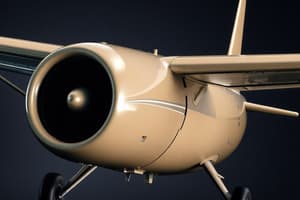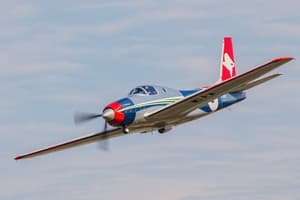Podcast
Questions and Answers
Which characteristic of Cayley's glider improved its stability?
Which characteristic of Cayley's glider improved its stability?
- Adding a tail (correct)
- Changing the wing shape
- Incorporating a biplane design
- Using lightweight materials
What was Otto Lilienthal's significant contribution to flight?
What was Otto Lilienthal's significant contribution to flight?
- He designed the first helicopter.
- He created the first jet engine.
- He invented the first powered airplane.
- He wrote a book on aerodynamics. (correct)
How did the Wright Brothers' approach differ from previous pioneers of flight?
How did the Wright Brothers' approach differ from previous pioneers of flight?
- They built large gliders only.
- They focused on powered flight exclusively.
- They avoided using wind tunnels.
- They conducted detailed research and testing. (correct)
What did the Wright Brothers learn from their kite experiments?
What did the Wright Brothers learn from their kite experiments?
What was the weight of the Wright Brothers'
What was the weight of the Wright Brothers'
What aspect of flight did George Cayley recognize was necessary for prolonged flight?
What aspect of flight did George Cayley recognize was necessary for prolonged flight?
What was the distance covered by the Flyer in its last flight?
What was the distance covered by the Flyer in its last flight?
What was a key feature of the Wright Brothers' engine design?
What was a key feature of the Wright Brothers' engine design?
Which type of construction is characterized as heavy and very sturdy for aircraft fuselages?
Which type of construction is characterized as heavy and very sturdy for aircraft fuselages?
What caused Otto Lilienthal's fatal crash?
What caused Otto Lilienthal's fatal crash?
What is the role of thrust in the forces of flight?
What is the role of thrust in the forces of flight?
Which category of airplane can sustain a maximum of +4.4Gs?
Which category of airplane can sustain a maximum of +4.4Gs?
In straight-and-level, unaccelerated flight, which of the following forces must be in equilibrium?
In straight-and-level, unaccelerated flight, which of the following forces must be in equilibrium?
What is the primary purpose of wings on an aircraft?
What is the primary purpose of wings on an aircraft?
Which type of aircraft design is lighter than truss type but sturdier than monocoque?
Which type of aircraft design is lighter than truss type but sturdier than monocoque?
What was the significant achievement of the Wright brothers on October 5, 1905?
What was the significant achievement of the Wright brothers on October 5, 1905?
What was the purpose of kites in ancient China?
What was the purpose of kites in ancient China?
What was a significant shortcoming of early attempts at flight using winged devices?
What was a significant shortcoming of early attempts at flight using winged devices?
Which invention is considered a precursor to the modern helicopter?
Which invention is considered a precursor to the modern helicopter?
How did the Montgolfier brothers manage to make their hot air balloon rise?
How did the Montgolfier brothers manage to make their hot air balloon rise?
What was significant about the first manned flight conducted by the Montgolfier brothers?
What was significant about the first manned flight conducted by the Montgolfier brothers?
What did Sir George Cayley contribute to the field of flight?
What did Sir George Cayley contribute to the field of flight?
What material did the Montgolfier brothers use for their balloon?
What material did the Montgolfier brothers use for their balloon?
Which of the following was NOT a feature of Leonardo da Vinci's ornithopter?
Which of the following was NOT a feature of Leonardo da Vinci's ornithopter?
What condition must be met for straight-and-level, unaccelerated flight?
What condition must be met for straight-and-level, unaccelerated flight?
Which part of an airfoil is defined as the forward most point?
Which part of an airfoil is defined as the forward most point?
How does Newton's Third Law of Motion apply to the generation of lift?
How does Newton's Third Law of Motion apply to the generation of lift?
According to Bernoulli's Principle, what happens when the velocity of air increases over the wing?
According to Bernoulli's Principle, what happens when the velocity of air increases over the wing?
Which of the following best describes an airfoil?
Which of the following best describes an airfoil?
What does the term 'angle of attack' refer to?
What does the term 'angle of attack' refer to?
What results from the pressure gradient force in flight?
What results from the pressure gradient force in flight?
Which statement is NOT true regarding relative wind?
Which statement is NOT true regarding relative wind?
Study Notes
History of Flight
- The kite, invented by the Chinese in the 5th century BC, was essential in understanding human flight and was utilized in religious ceremonies and weather tests.
- Tower jumping practices from 852 CE revealed the limitations of human musculature in mimicking bird flight, leading to disastrous attempts.
- Leonardo da Vinci's 15th-century ornithopter design provided early insights into flight, laying groundwork for future flying machines, though it was never built.
- The Montgolfier brothers invented the first hot air balloon in 1783, using heated air to achieve lift, with the inaugural manned flight occurring on November 21, 1783.
- Sir George Cayley, known as the "father of aviation," made significant advancements in glider design in 1792, focusing on wing shape and stability.
- Otto Lilienthal, a German engineer (1881-1896), conducted extensive studies on aerodynamics and designed the first successful human-carrying glider.
- The Wright brothers, Orville and Wilbur, achieved the first powered flight on December 17, 1903, with their Flyer, which traveled 120 feet in 12 seconds.
The Aircraft
- An aircraft is any vehicle capable of flight, gaining support from the air.
- Categories include airplanes, rotorcraft, gliders, and lighter-than-air vehicles.
Types of Airplane
- Airplanes come in various classifications, including single-engine (land and sea) and multi-engine (land and sea).
- Examples of airplane models: Cessna 152, Boeing 787, and Airbus A350.
Parts of an Aircraft
- Fuselage: The central body designed for crew, passengers, and cargo.
- Construction types:
- Truss type: Sturdy but heavy.
- Monocoque: Light but less durable.
- Semi-Monocoque: Balanced durability and weight.
- Construction types:
- Wings: Airfoils that generate lift.
- Empennage: Stabilizing structure at the tail end of the aircraft.
- Landing Gear: System supporting the aircraft during landing and ground movement.
- Powerplant: Engine system providing thrust.
Four Forces of Flight
- Lift: Upward force generated as air flows around the wings.
- Weight: Downward gravitational force acting on the aircraft.
- Thrust: Forward force produced by engines or propellers.
- Drag: Opposing force acting against thrust, limiting performance.
Straight-and-Level, Unaccelerated Flight
- Conditions for level flight require lift equal to weight and thrust equal to drag.
Lift and Airfoils
- Lift is perpendicular to relative wind and is essential for flight.
- Airfoil: A surface generating aerodynamic force.
- Relative Wind: Airflow opposite to the direction of flight.
- Angle of Attack: The angle between the chord line of the wing and relative wind.
Theories of Lift
- Newton’s Third Law: Air deflection downward results in an equal and opposite lift.
- Bernoulli’s Principle: Increased airspeed over the wing leads to decreased pressure above it, creating lift through pressure differences.
Studying That Suits You
Use AI to generate personalized quizzes and flashcards to suit your learning preferences.
Related Documents
Description
Explore the fundamentals of flight theory in this AMT-114 quiz. Covering the history of flight, aircraft structures, the four forces of flight, and control effects, you’ll deepen your understanding of aviation principles. Perfect for students at Aviation College.




